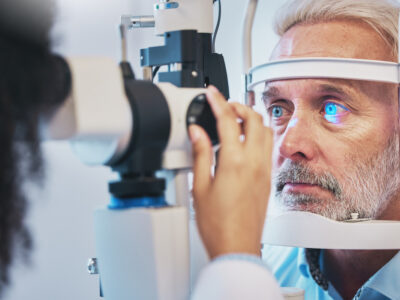Table of Contents[Hide][Show]
From the moment you wake up to the moment you fall asleep, your eyes are hard at work. Add to that the stress placed by hours in front of a screen, and it’s no wonder that eye disease and poor vision are so common.
In fact, over 12 million Americans over the age of 40 suffer from vision impairment of some sort.
Luckily, good eye health is more achievable than you might have thought, with the help of the right diet choices and good eye care practices.
Let’s take a closer “peep” at some of the top things you can start doing today to protect your eyes.
1. Get an Eye Exam
First things first, get a comprehensive eye exam, one that includes getting your eyes dilated.
Eye diseases don’t always have early symptoms. But a thorough exam can find the warning signs of eye disease before it results in more severe eye issues.
So even if you think your eyes are healthy, make sure you get your eyes checked!
How often should you visit your eye doctor?
Here are some general guidelines.
- Children age 3 and younger: Your pediatrician should check your child’s eyes early on for signs of healthy development or common childhood eye problems, such as lazy eye, cross-eyes, or misaligned eyes. Between the ages of 3 and 5, your child should have their first eye exam.
- School-aged children and adolescents: Children should have their eyes checked before entering kindergarten. Going forward, your child’s doctor will tell you how often you should get their vision checked.
- Adults: From the ages of 20-39, most adults with healthy vision should have an eye exam every 5 years. If your eyes are healthy and you have no symptoms of eye disease or vision problems, you should still have a comprehensive eye exam at age 40, when vision changes and eye disease are likely to begin. Your eye doctor will tell you how often to get future exams, based on the results.
You should have your eyes checked more often if:
- You’re age 60 or older
- Wear corrective glasses or contact lenses
- Have a family history of eye disease or vision loss
- Suffer from a disease or illness that increases your risk of eye or vision problems
- Take medications with side effects that can impact your eye health or vision
Your exam should include eye dilation, which is the only way your eye doctor can complete a thorough exam of your retina.
2. Eat Eye-Healthy Foods
You are what you eat, and that extends to your eyes. Eating the right nutritious foods will keep your eyes strong and healthy.
Some of the most eye-healthy nutrients are:
- Lutein: the “eye vitamin” that protects your eyes from sunlight damage and prevents eye diseases
- Omega-3 fatty acids: support retinal health, lower the risk of age-related macular degeneration and glaucoma, help prevent dry eyes
- Vitamin A: helps with night vision
- Vitamin C: good for ocular blood vessels, lowers the risk of cataracts
- Vitamin E: slows age-related macular degeneration, lowers the risk of cataracts
- Zeaxanthin: protects your eyes from light damage and age-related diseases
- Zinc: delivers vitamin A from your liver to your retina
Related
Age-Related Macular Degeneration and the Gut Connection
Discover the best ways to protect your vision from age-related macular degeneration, including the surprising connection between gut health and AMD.
The next time you go to the grocery store, make sure your shopping cart contains these foods for eye health.
Beans and Legumes
If you prefer to get your zinc from non-meat sources, chickpeas, black-eyed peas, kidney beans, and lentils are all especially effective.
Broccoli and Brussel Sprouts
These delicious veggies contain vitamins A, C, and E, the main three vitamins for eye health.
Dark, Leafy Greens
Spinach, kale, and collard greens are incredibly high in vitamins C and E. They also contain lutein, which your body transforms into vitamin A.
Eggs
Eggs contain lutein, zeaxanthin, and zinc, three of the most important eye-healthy nutrients.
Fish
The omega-3 fatty acids (DHA and EPA) found in certain fatty fish help your retinas to work properly. Salmon, tuna, and trout, as well as other forms of seafood, all contain high levels of omega-3 fatty acids. Oysters are also great for your eyes, containing higher levels of zinc per serving than any other food.
Fish oil can also be effective against dry eyes, including that caused by too much screen time.
(Lean) Meats
Beef has the highest level of zinc, but poultry and lean meats (including pork) are all high in zinc, too.
Red Bell Peppers
Red bell peppers are higher in vitamin C per calorie than other fruits and vegetables. However, it’s broken down by heat, so eat it raw whenever possible. Red bell peppers also contain vitamins A and E.
Squash
Squash contains lutein and zeaxanthin. Summer squash also contains vitamin C and zinc, while winter squash provides vitamins A and C and omega-3 fatty acids.
Sunflower Seeds and Nuts
Just one ounce contains half of the recommended daily allowance of vitamin E. Cashews, hazelnuts, peanuts, and peanut butter are also good options.
Sweet Potatoes
Sweet potatoes offer a triple bang for your eye health. They’re high in vitamins A and C and also contain vitamin E. Other orange-colored fruits and vegetables, such as apricots, cantaloupes, carrots, and mangos also contain high levels of vitamin A.
3. Quit Smoking
The ill effects of smoking are well known, especially when we’re talking about cancer and lung health. Lesser-known side effects, however, include negative impacts on your eye health and vision.
Here are a few of the eye diseases that are caused or made worse by smoking.
- Macular degeneration: 3-4 times more likely in smokers
- Cataracts: 3 times more likely in heavy smokers (15 or more cigarettes per day)
- Glaucoma: smoking is linked to glaucoma risk factors such as high blood pressure
- Diabetic retinopathy: smoking can increase diabetes and increase diabetic complications
- Dry eye syndrome: twice as likely to affect smokers
4. Practice Good Contact Lens Habits
Contact lenses can cause eye infections if you aren’t careful.
Practice good hygiene habits such as washing your hands before touching your contacts, following cleaning instructions carefully, and replacing your contact lenses as necessary.
Also, make sure you only wear contacts for the recommended length of time.
5. Wear Sunglasses
Exposing your eyes to UV rays is one of the worst things you can do for your eye health!
Just as sunscreen protects your skin from harmful rays, sunglasses protect your eyes. And, just like sunscreen, you should wear sunglasses every time you head outdoors, even if it’s cloudy.
Look for sunglasses that protect your eyes from 99% to 100% of both UVA and UVB radiation. Wraparound sunglasses are particularly good for this purpose, since they block sunlight from the sides, too.
6. Protect Your Eyes
If you’re participating in an activity that could result in an eye injury, wear protective glasses or goggles. This includes construction work, home repairs, and other projects that could cause materials to go airborne.
You should also protect your eyes when practicing sports that could result in eye injuries, such as hockey or racquetball.
7. Take Computer Breaks
Whether it’s for work or to unwind, most people spend large blocks of time looking at a computer or phone.
Unfortunately, all of this screen time can put your eyes under stress and tire them out.
To combat the effects of being on a screen, give your eyes a break often by practicing the 20-20-20 rule. Every 20 minutes, look at something 20 feet away for 20 seconds.
Related
Junk Light is the New Junk Food
Keep it Simple: Let the Right Light In. When we think about optimizing our health, oftentimes, the first idea that pops into our heads is changing our diet. But what if the light we take in has just as much to do with our vitality as the nutrients we consume? The light we are exposed …
8. Stay Active
Being physically active is important for your health in general. Physical activity can lower your chances of developing conditions such as diabetes, high blood pressure, and high cholesterol, all of which can cause vision problems and poor eye health.
9. Take a Probiotic
Probiotics keep your entire body healthy, not just your eyes.
Probiotics contain bacteria that are identical or very similar to the beneficial (“good”) bacteria that already occupy your gut microbiome. When you consume probiotics, they join forces with the good bacteria, shoring up their strength and numbers. They also crowd out pathogenic (“bad”) bacteria, helping you maintain a healthy gut.
But how does your gut health affect your eyes?
By keeping your body functioning optimally, probiotics can lower your risk of developing conditions that lead to eye diseases, such as diabetes and high blood pressure.
Research also shows that probiotics can help with allergic conjunctivitis, inflammation, and dry eye.
And, probiotics can also help with weight management, which in turn reduces your chances of developing type 2 diabetes—the leading cause of blindness in adults.
You can get your probiotics from certain foods and drinks, particularly those which are fermented. Popular choices include yogurt, kombucha, pickles, and more.
But the best way to make sure you are getting enough probiotics and that they are actually working is by taking a high-quality spore probiotic, such as our favorite one from Just Thrive. This supplement contains proprietary strains of four clinically-proven spore-based bacteria. Their protective spore shell guarantees that they arrive alive in your gut, ready to get to work balancing your microbiome and supporting your overall health.
A healthy, happy gut equals a healthy, happy body—and that includes your eyes!
Final Thoughts
Keeping your peepers healthy should be one of your top priorities. Luckily, it’s surprisingly simple to protect your eyes… and your vision.
The most important thing you can do is to establish good eye health practices, such as wearing sunglasses, early on. This helps protect your vision and prevent age-related eye diseases.
And make sure you eat eye-friendly foods, too. Your favorite snacks can give your vision the boost it needs!
You May Also Like…






